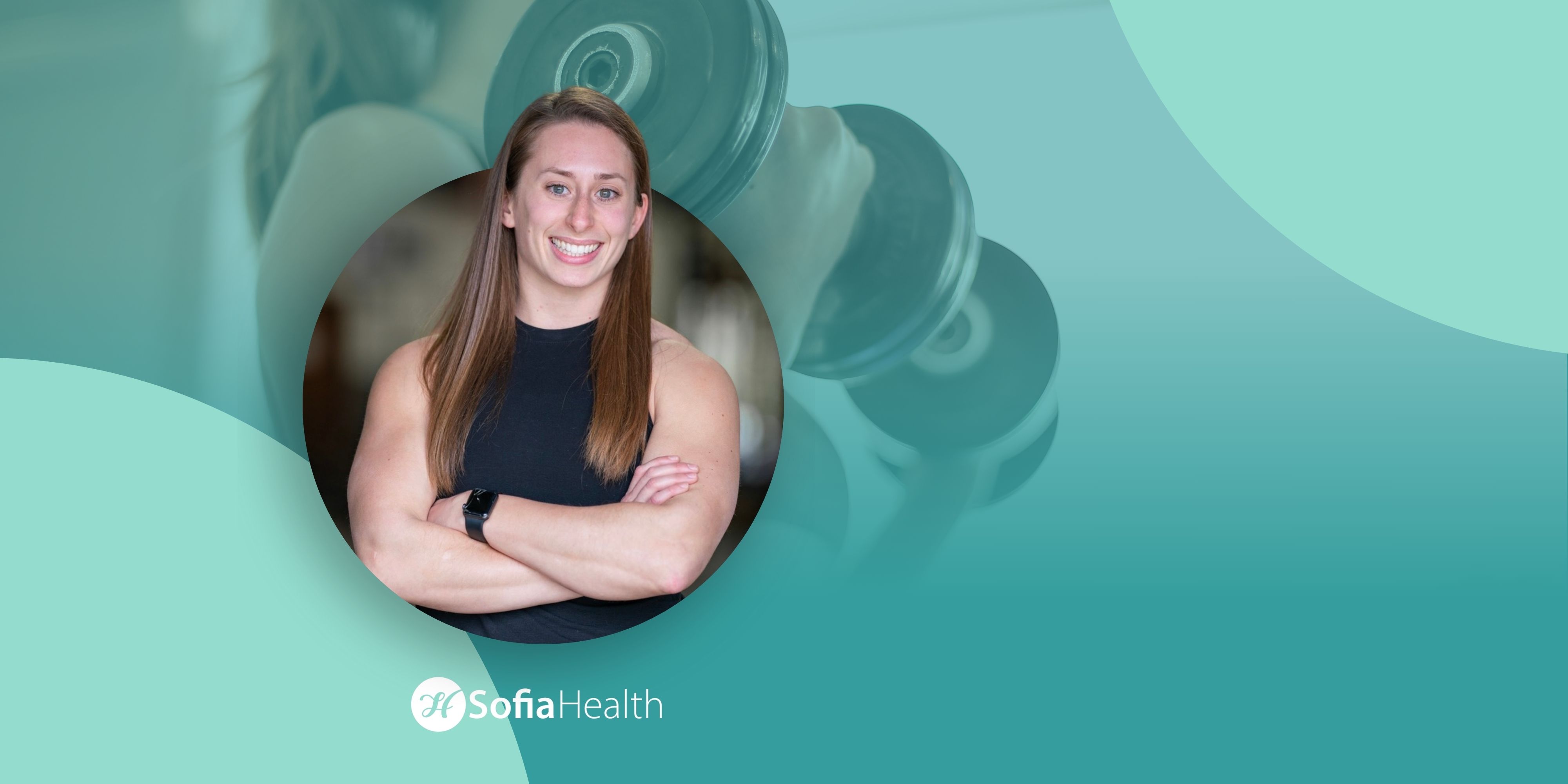Introducing Kelly McKinnon, the Head Registered Dietitian at Built with Science. With a wealth of experience spanning over four years, Kelly oversees a team of eight professionals, ensuring client satisfaction and goal achievement. She specializes in product development, crafting cutting-edge nutrition programs, and offering tailored guidance on calorie and macronutrient intake. Join us as Kelly shares his expertise in this exclusive interview with Sofia Health.
How do carbs, protein, and fat impact weight loss and muscle building? Is it possible to design a diet to achieve both at the same time?
When aiming for body composition changes, the key factor is total calorie intake. Consuming more calories than your total daily energy expenditure (TDEE) leads to weight gain (calorie surplus) while consuming fewer results in weight loss (calorie deficit).
Most people want to lose body fat, not muscle. To target fat loss, maintain a moderate calorie deficit (250-500 calories) and focus on macronutrients, especially protein, aiming for 1.6-2.2 grams per kilogram of body weight daily. Keep fat intake around 25% of total calories, and the rest goes to carbohydrates for energy.
Engage in resistance training to maintain or build muscle mass, and keep active outside workouts. For muscle building, aim for a small calorie surplus (200-500 calories) with progressive resistance training. Maintain the same macronutrient balance, with more calories allocated to carbs to fuel workouts.
Body recomposition, losing fat, and gaining muscle simultaneously, are possible but take time. It’s more effective for beginners, those with high body fat, or those returning to training. Focus on hitting protein targets and maintaining a small calorie deficit or maintenance calories, ensuring effective and progressive training.
How can you help people with food restrictions, like allergies, still reach their fitness and nutrition goals?
I’ve worked with so many individuals with food allergies, intolerances, and preferences! As a dietitian, when I work with an individual, I never tell them what to eat; rather, I educate them on how to make optimal food choices and balance their nutritional needs to meet their goals. So whether you have food allergies, intolerances, cultural preferences, or even if you just don’t like a particular food, we’re still able to work together to form an optimal plan to meet your goals!
Sofia Health connects you to traditional, integrative, nutritional, holistic, and spiritual healing professionals to help you personalize your healing journey.
How do you use motivational interviewing to help clients overcome challenges and build healthy habits that last?
Motivational interviewing is client-centered counseling with the ultimate goal of promoting positive behavior change. In other words, during my sessions with clients, I help to facilitate the conversation with open-ended questions, and the client does the majority of the talking.
Have you ever been told to do something, but are highly resistant to doing that task simply because somebody told you to do it? Well, during motivational interviewing, the goal of asking open-ended questions is to get to the root cause of the behavior and come up with a solution – all on your own. Change has to come from within you, otherwise, you will be incredibly hesitant to make that change even if you know it’ll help you to reach your goals or improve your health.
Why is staying hydrated important for both weight loss and athletic performance? How much water should you drink every day?
The base of our blood is water, which is crucial for delivering oxygen and nutrients to muscles and organs, especially during exercise. Dehydration makes blood more concentrated, forcing the heart to work harder. Even a 2% body weight loss from water can impair physical and cognitive function, making exercise feel harder.
Hydration is key for energy and brain function. Keep a water bottle handy, especially for those with body composition or sports goals. Fluid intake includes not just water but also coffee, tea, juice, fruits, vegetables, and even ice cream. Hydration needs vary, but a good starting point is 3 liters for females and 4 liters for males. Check urine color for hydration levels—clearly indicates proper hydration.
Athletes should also consider electrolytes, especially when sweating heavily or in hot/humid conditions, as they help regulate fluid balance. Remember to space hydration throughout the day, just like food and protein intake.
How can people who struggle with cravings or emotional eating develop a healthier relationship with food?
The first step in changing a behavior is recognizing and acknowledging it. The next step is identifying its root cause. Emotional eating and cravings often arise from stress or boredom, not physical hunger. Clients should pause to understand why they’re eating a particular food.
After identifying the root cause, incorporate mindful eating and stress management strategies. Mindful eating involves being fully present while eating, paying attention to taste, aroma, texture, and how the food makes you feel, without any distractions.
Stress management varies for everyone. Find what works for you, whether it’s walking, playing an instrument, listening to a podcast, or talking to a loved one. Observe how reducing stress impacts your cravings and desire for food.
How do you approach nutrition coaching for beginners who are new to exercise? How can you help them set realistic goals and expectations?
My approach is simple because making too many changes at once can overwhelm beginners and lead to quitting. Here’s my general strategy:
- Improve Meal Frequency: Eat every 3-4 hours to maintain energy and manage hunger.
- Enhance Meal Quality: Learn about macronutrients and build balanced plates. Fill ¼ of the plate with protein, ¼ with carbs, and the remaining half with vegetables and/or fruit. Include fat when necessary.
- Track Food Intake: Use a food scale, measuring cups, or a calorie-counting app to monitor how much you’re eating. This helps in understanding actual calorie intake and aids in body composition changes.
- Focus on Calories and Protein: Prioritize these macros for body composition changes.
- Optimize Pre-Workout Nutrition: Once consistent with calorie and protein intake, delve into carbs and fats, and refine pre-workout nutrition.
Setting realistic goals and expectations is crucial. I draw on past client experiences to help set achievable goals, ensuring you’re not disappointed by overly ambitious targets.
What advice do you offer for achieving optimal health and well-being?
My nutrition philosophy and what I tell everybody that I work with is that nutrition isn’t and shouldn’t be complicated. If somebody is telling you that you can’t eat this or you can’t eat that, especially without giving evidence and context, then you should question that individual. Eating a balanced diet filled with lean protein, fruits, vegetables, whole grains, nuts, seeds, and some dairy products is really all you have to do. Pay attention to portion sizes, exercise regularly & incorporate resistance training into your routine, sleep 7-9 hours each night, and keep stress levels low. It may be easier said than done, but there is no “magic pill” for maintaining optimal health and maintaining an optimal body weight.
More from Sofia Health
Explore more enlightening interviews with specialists at Sofia Health. Gain diverse insights, practical tips, and transformative advice on health and wellness topics. Whether it's nutrition, mental well-being, or holistic healing, these expert interviews provide valuable resources for your journey to holistic health. Please read on and help yourself with knowledge for a healthier life.
Whether you prefer a subscription over live classes or want to shop for individual services, classes, or products, we have you covered. We're here to help you meet your wellness goals for physical, mental, emotional, and spiritual health. You can also take advantage of the services offered by one of the providers at the Sofia Marketplace.
Better yet, make a daily dose of wellness part of your routine. Sofia Prime offers both live classes and an extensive on-demand video library. Choose from high-quality offerings in wellness, nutrition, fitness, and meditation.
Start your two-week trial today and discover the difference that dedication and expert help can make.
Disclaimer: The Sofia Unfiltered Blog by Sofia Health is for general informational and entertainment purposes only and does not constitute the practice of medicine, nursing, or other professional healthcare services, including the giving of medical advice. No doctor/patient relationship is formed. The use of information in this article or materials linked from this article is at the user’s own risk. The content of this article is not intended to be a substitute for professional medical advice, diagnosis, or treatment. Users should not disregard or delay in obtaining medical advice for any medical condition they may have. For any health concerns, users should seek the assistance of their healthcare professionals.






